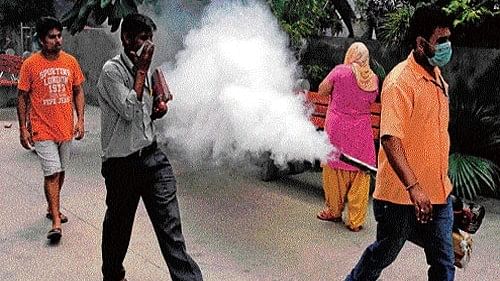
In the South zone, which saw the highest number of cases in August, the BBMP (Bruhat Bengaluru Mahanagara Palike) has implemented a schedule to ensure source reduction activities are carried out in all types of localities, not just slums.
Credit: DH Photo
Dengue cases, which reached their peak in July, have not shown a significant decrease in Bengaluru, according to doctors.
Pediatricians report that 10 per cent to 20 per cent of dengue patients are now requiring hospitalization. Dr. Rajath Athreya, a pediatrician and member of the state’s Covid Technical Advisory Committee, notes that this includes admissions to the ICU.
Dr Shivaprakash Sosale, another paediatrician, also states that 10% to 20% of patients are being admitted, with few requiring ICU care. He adds that children who are obese are at a higher risk.
“In most cases, we encourage oral fluid intake and closely monitor patients. If oral intake becomes difficult, and the patient experiences severe symptoms such as vomiting and abdominal pain, we administer IV fluids.”
Since fluid loss is the primary cause of complications in dengue cases, the primary focus of treatment is now fluid replacement. According to the latest guidelines, blood product transfusion is rarely necessary.
Infectious disease consultant Dr John Paul reveals that his hospital is receiving 18 to 24 adult dengue patients per week. Of these, 70% require admission either due to warning signs or because they belong to high-risk categories such as senior citizens or individuals with comorbidities. “Most patients have a moderate form of the disease, and ICU admissions are limited,” he notes.
In the South zone, which saw the highest number of cases in August, the BBMP (Bruhat Bengaluru Mahanagara Palike) has implemented a schedule to ensure source reduction activities are carried out in all types of localities, not just slums.
In the South zone, apartments and elite localities are covered on Mondays through coordination with resident welfare associations, slums on Tuesdays, construction sites on Wednesdays, and government buildings on Fridays. On Thursdays, ASHAs (Accredited Social Health Activists) survey areas where dengue cases have been reported.